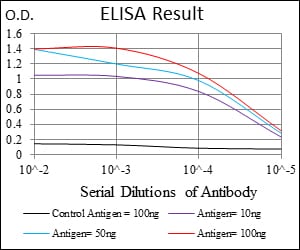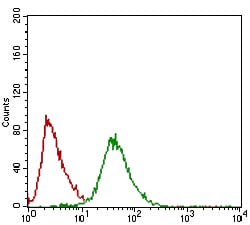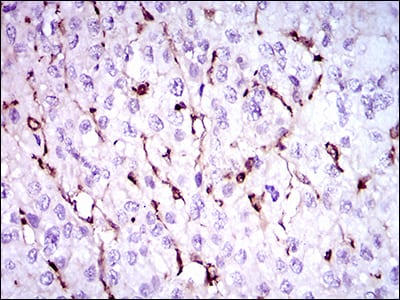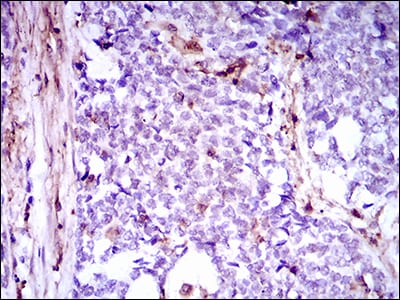



| WB | 咨询技术 | Human,Mouse,Rat |
| IF | 咨询技术 | Human,Mouse,Rat |
| IHC | 1/200 - 1/1000 | Human,Mouse,Rat |
| ICC | 技术咨询 | Human,Mouse,Rat |
| FCM | 1/200 - 1/400 | Human,Mouse,Rat |
| Elisa | 1/10000 | Human,Mouse,Rat |
| Aliases | NPC |
| Entrez GeneID | 4864 |
| clone | 8D10G3 |
| WB Predicted band size | 142.2kDa |
| Host/Isotype | Mouse IgG1 |
| Antibody Type | Primary antibody |
| Storage | Store at 4°C short term. Aliquot and store at -20°C long term. Avoid freeze/thaw cycles. |
| Species Reactivity | Human |
| Immunogen | Purified recombinant fragment of human NPC1 (AA: 34-174) expressed in E. Coli. |
| Formulation | Purified antibody in PBS with 0.05% sodium azide |
+ +
以下是关于NPC1抗体的3篇参考文献,包含文献名称、作者及简要摘要内容:
1. **文献名称**:*"Characterization of the Niemann-Pick C1 protein and its antibodies in lysosomal cholesterol trafficking"*
**作者**:Garver WS, et al.
**摘要**:该研究通过生成NPC1特异性抗体,揭示了NPC1蛋白在溶酶体胆固醇转运中的功能异常,为尼曼-匹克病C型的分子机制提供了实验依据。
2. **文献名称**:*"Antibody-based analysis of NPC1 expression in cellular models of lysosomal storage disorders"*
**作者**:Pfeffer SR, et al.
**摘要**:利用NPC1抗体检测多种溶酶体贮积症细胞模型中NPC1蛋白的表达水平,发现其表达异常与胆固醇积累相关,为疾病诊断提供了潜在标志物。
3. **文献名称**:*"Immunolocalization of NPC1 in neuronal and non-neuronal tissues: implications for Niemann-Pick disease pathogenesis"*
**作者**:Yu T, et al.
**摘要**:通过免疫组化和Western blot技术,使用NPC1抗体分析其在神经和非神经组织中的分布,揭示NPC1缺失导致神经元胆固醇代谢紊乱的病理机制。
4. **文献名称**:*"Development of a monoclonal antibody targeting the luminal domain of NPC1 for diagnostic applications"*
**作者**:Sleat DE, et al.
**摘要**:研究开发了一种靶向NPC1蛋白腔内侧结构域的单克隆抗体,验证其在患者成纤维细胞中的诊断价值,提高了尼曼-匹克病C型的检测灵敏度。
以上文献均聚焦于NPC1抗体的开发、应用及其在疾病机制研究中的作用。如需具体期刊或年份信息,可进一步补充。
NPC1 (Niemann-Pick type C1) antibodies are critical tools in studying NPC1 protein function and associated diseases. NPC1 is a lysosomal transmembrane protein encoded by the *NPC1* gene, which facilitates intracellular cholesterol trafficking. Mutations in *NPC1* cause Niemann-Pick disease type C (NP-C), a rare lysosomal storage disorder characterized by cholesterol accumulation in lysosomes, leading to neurodegeneration, hepatosplenomegaly, and premature death. NPC1 antibodies are primarily used to detect the expression, localization, and abundance of NPC1 protein in cells and tissues, aiding in NP-C diagnosis and research.
In diagnostics, these antibodies help identify NPC1 protein deficiencies or mislocalization in patient-derived fibroblasts, confirming NP-C. Research applications include elucidating NPC1’s role in lipid metabolism, lysosomal function, and neurodegenerative pathways. Studies also utilize NPC1 antibodies to evaluate experimental therapies, such as small-molecule chaperones or gene therapies aiming to restore NPC1 function. Additionally, they contribute to understanding NPC1 interactions with viral proteins, notably its role as an intracellular receptor for Ebola virus entry.
Recent advances highlight NPC1 antibodies in biomarker development and drug screening. However, challenges remain in standardizing assays due to variable antibody specificity. Ongoing research aims to refine antibody-based tools to better dissect NPC1 biology and accelerate therapeutic discovery for NP-C and related disorders.
×